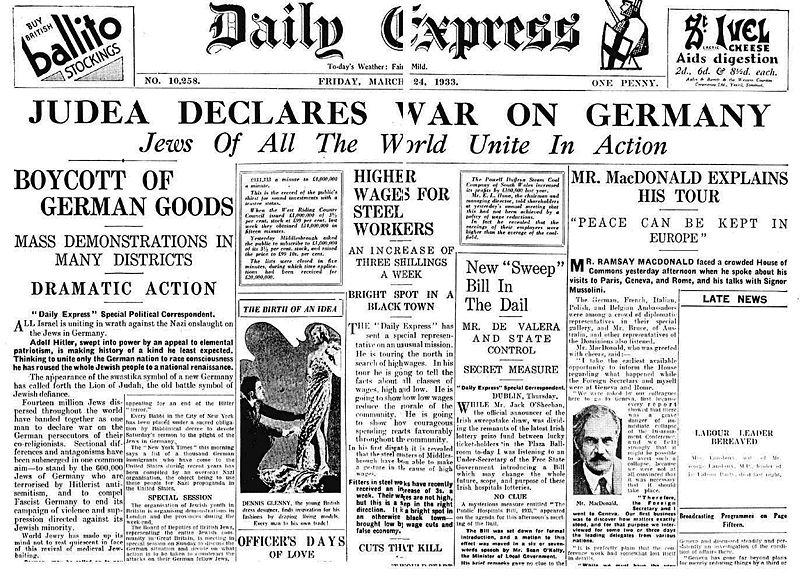 |
 |
Jews declared war on Germany
Question
Did the Jews "Declare War" on Germany?
Andrew Mathis responds:
On Friday, March 24, 1933, the headline "Judea Declares War on Germany" was splashed across the front page of the British newspaper Daily Express. The subheads read: "Jews Of All The World Unite In Action"; "Boycott of German Goods"; "Mass Demonstrations in Many Districts"; and "Dramatic Action." The transcript of the unsigned article can be read here: http://www.h-ref.de/feindbilder/juedische-kriegserklaerungen/daily-express-original.php
To say that the headline was an overstatement is, well, an understatement. Never mind the language used in the article (there was no geographical entity called "Judea" in 1933 and certainly none that had the power to declare war, and the world's Jews are referred to as "Israel," which is not even a liturgical usage), it is riddled with inaccuracies. The largest of these is that the entirety of the world's Jews took part in this boycott. It should be borne in mind, e.g., that Germany's Jews themselves (numbered at 600,000 in the article itself) certainly could not participate in the boycott. Furthermore, the yishuv (pre-state Jewish settlement in Palestine) entered into negotiations with the Third Reich, ultimately entering into the Transfer Agreement in 1935, which would have been in flagrant violation of any worldwide Jewish boycott of Germany, real or imagined. The Jewish population of Palestine in 1931 was 175,000; it is only logical to assume that the population was larger in 1933, and, in fact, another 50,000 Jews emigrated to Palestine before WWII as a direct result of the Transfer Agreement. Thus we have nearly a million Jews in Germany and Palestine alone not honoring any boycott of German goods.
Another serious problem with the Daily Express article is that it does not -- anywhere in the article -- mention any single Jew, either a leader of a group or an individual, by name. Not one name. Some organizations are mentioned, e.g., The Board of Deputies of British Jews, who, the article says, will meet two days later "to discuss the German situation." Ironically, the London Times of March 27 reported that the Board of Deputies did not support a boycott. The U.K. had one of the largest Jewish populations of western Europe at the time.
![]()
![]()
Part of the confusion over the issue of a "Jewish boycott" is that there were people or organizations that did call for a boycott. The American Jewish Congress (AJC) called for a boycott, as did Samuel Untermeyer, a lawyer and businessman and head of the Non-Sectarian Anti-Nazi League. However, even though these boycotts were bona fide, they were no more effective than the anonymous call in the Daily Express. Another part of the confusion over this boycott is that deniers, either deliberately or through ignorance, conflate these boycotts into a single boycott and usually throw them all under the aegis of the call from the Daily Express, even though no relationship existed between that newspaper and Untermeyer or the AJC.
Finally, we should consider what effect, if any, these calls for boycotts had. The answer is that the economic effect on Germany was quite small. Not only were there many, many Jewish communities that did not honor calls for boycotts -- either for fear that the lot of German Jews would worsen or because their own interests were against them -- but Germany was in full economic recovery by 1937 from being on the brink of economic collapse in the early 1930s. This was a result of instituting a war-based economy almost from the moment the Nazis took power in January 1933. A boycott of German exports is not going make any kind of serious dent in an industry (munitions) that relies much more on internal resources, employment of German workers, and importing rather than exporting the materials needed for production.
back to the list of questions
